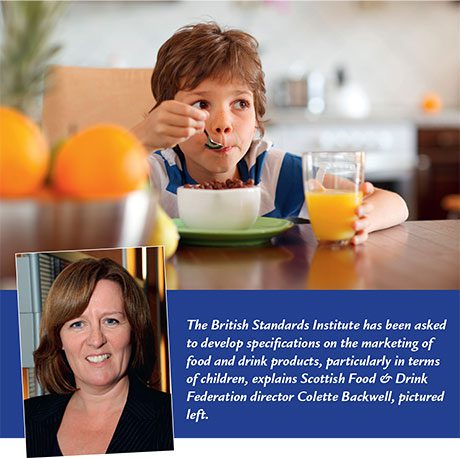May is shaping up to be an important month for the future of food policy and marketing guidelines. The Scottish Food and Drink Federation’s Colette Backwell argues that everyone in the chain should help build an effective inclusive system.

THE role that food and drink manufacturers can play in helping consumers lead healthy, balanced lives has been the subject of much discussion recently. As the largest manufacturing sector in Scotland and in the UK, the food industry is acutely aware of its responsibilities in tackling public health issues.
The debate in Scotland will come into sharp focus in the coming weeks and months and it is crucial that the industry feeds into important initiatives that the Scottish Government is taking forward. These include consultations and events directed towards delivery of the National Food and Drink Policy (2009) and the Obesity Route Map Action Plan (2011). The Action Plan encompasses over 60 activities in four areas – energy consumption, energy expenditure, early years, and working lives. Whether it is through recipe reformulations, the development of healthier choices, packaging innovations or workplace initiatives, manufacturing businesses are aware of the need to play their part – many have a long history of undertaking this vital work.
As part of the Action Plan, the Scottish Government has asked the British Standards Institute (BSI) to develop a publicly available specification on the marketing of food and drink products. It is understood that the standard is likely to focus on promotions, particularly in relation to the marketing of foods high in fat, salt and sugar to children. While we recognise the importance of promoting marketing best practice across the industry, we must also acknowledge UK food and drink manufacturers’ strong track record of creating brands which people trust and which offer quality, value and choice. Respecting this trust, many manufacturers go beyond the UK’s existing strict regulatory regime.
The Scottish Government’s food marketing work is a key component of its emerging voluntary industry framework. The aim of developing a framework is to encourage industry to continue undertaking work to deliver on the ‘energy consumption’ part of the Obesity Route Map, building on achievements to date.
The Scottish Government will meet with the food industry this month to discuss draft ideas for voluntary proposals. This work will be informed by the revised Scottish Dietary Goals, scheduled to have been published in April. The revised goals, the first substantive update of dietary targets since the 1990s, will provide a clear picture of where the average Scottish diet is today and where the government is trying to move it to. Looking ahead, 22 May is the closing date for responses to the Scottish Government’s proposals for a new food body to replace the Food Standards Agency in Scotland.
Public health is everybody’s business. As showcased in our new report “Delivering Healthy Growth”, food and drink companies can demonstrate good progress in working with government and other stakeholders to drive better public health outcomes, while delivering sustainable growth for the economy. To achieve impact the constructive engagement of manufacturers, retailers and caterers – will be required. I would urge all businesses across the supply chain to engage with this debate so that we can combine efforts to tackle public health issues.














